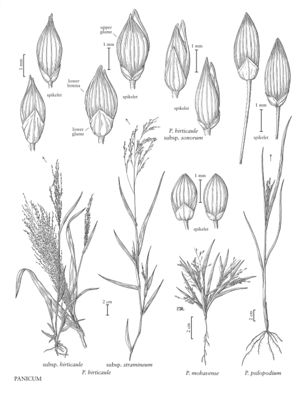familyPoaceae
subfamilyPoaceae subfam. Panicoideae
genusPanicum
subgenusPanicum subg. Panicum
sectionPanicum sect. Panicum
speciesPanicum hirticaule
subspeciesPanicum hirticaule subsp. sonorum
Difference between revisions of "Panicum hirticaule subsp. sonorum"
Treatment appears in FNA Volume 25. Treatment on page 462.
FNA>Volume Importer |
FNA>Volume Importer |
||
| Line 15: | Line 15: | ||
-->{{Treatment/Body | -->{{Treatment/Body | ||
| − | |discussion=<p>Panicum hirticaule subsp. sonorum has been collected only a few times. Its range extends from southern Arizona to Chiapas, Mexico. It may have originated through selection and cultivation. The Cocopa tribe of the extreme lower Colorado River region grow it for the seed, which is used for food.</p> | + | |discussion=<p><i>Panicum hirticaule </i>subsp.<i> sonorum</i> has been collected only a few times. Its range extends from southern Arizona to Chiapas, Mexico. It may have originated through selection and cultivation. The Cocopa tribe of the extreme lower Colorado River region grow it for the seed, which is used for food.</p> |
|tables= | |tables= | ||
|references= | |references= | ||
| Line 35: | Line 35: | ||
|publication year= | |publication year= | ||
|special status= | |special status= | ||
| − | |source xml=https://jpend@bitbucket.org/aafc-mbb/fna-data-curation.git/src/ | + | |source xml=https://jpend@bitbucket.org/aafc-mbb/fna-data-curation.git/src/8f726806613d60c220dc4493de13607dd3150896/coarse_grained_fna_xml/V25/V25_1241.xml |
|subfamily=Poaceae subfam. Panicoideae | |subfamily=Poaceae subfam. Panicoideae | ||
|tribe=Poaceae tribe Paniceae | |tribe=Poaceae tribe Paniceae | ||
Revision as of 16:29, 18 September 2019
Culms 60-100 cm, robust; nodes hirsute, hairs papillose-based. Sheaths hirsute, hairs papillose-based; blades 4-30 mm wide, hirsute, hairs papillose-based, cordate, clasping basally. Panicles nodding. Spikelets 3-3.3 mm; lower paleas more than 1/2 as long as the upper florets. 2n = unknown.
Discussion
Panicum hirticaule subsp. sonorum has been collected only a few times. Its range extends from southern Arizona to Chiapas, Mexico. It may have originated through selection and cultivation. The Cocopa tribe of the extreme lower Colorado River region grow it for the seed, which is used for food.
Selected References
None.
Lower Taxa
None.
... more about "Panicum hirticaule subsp. sonorum"
